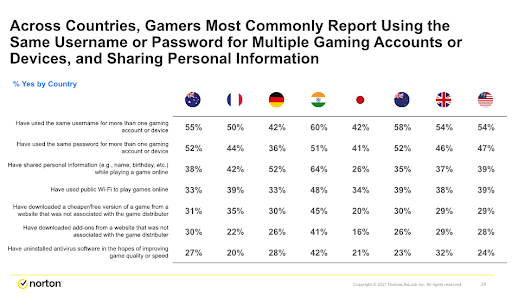A study reveals that 47% of online gamers have suffered cybersecurity attacks that have led to huge financial loss or other personal tolls.
Gaming’s become a massive industry, with thousands of individuals across the world currently making a living by streaming themselves playing video games. What was thought to be a hobby, and a very frowned upon one at that, is now an incredibly lucrative endeavor that enables people to truly live their lives out. Sure, not everyone makes a million dollars or any of that jazz, but far behind are the days when streaming content was considered useless and frivolous. Well, in the current generation at least. Older generations still tend to infantilize and patronize such avenues of making money, even as they celebrate 50-year-old commentators doing the same thing with sports. Then again, irony is a concept often lost upon most individuals. Point is, gaming and livestreaming is as valid a job option as the arts or sciences.
Of course, online gaming does lend itself to a lot of attention from the wrong sorts of people. An online audience means that far more people know you than the average wage earner, and that sort of pedestal can prove damaging. A particular form of negative attention that I’m referring to in this article is that offered up by cyber criminals. Of course, when I say offer, I should also clarify that such seedy individuals have no intention of returning said individual attention. They’ve got a target, and now they’re going to aim for the jugular.
A study conducted by NortonLifeLock reveals that almost half of all online gamers have suffered from a form of cybersecurity threat or another. Mostly, such attacks are conducted in the pursuit of money. The study displays that 3 out of every 4 affected streamers lost money in the process of an attack being conducted, with streamers on average losing approximately USD $744 per individual. That’s already horrifying, but many such cyber criminals are also out for other, more incriminating items. Female streamers are often afflicted by individuals who gain access to private photos and messages, with the intention of blackmail, personal voyeurism, and just being a disgusting little creep in general. Yikes. A fifth of the entire sample population of the research survey also revealed that 21% of them had also been doxxed at one point, which is a terrifying ordeal. Take a look at below charts for more insights:
Read next: A Study Reveals That Over Half Of The US Consumers Believes Paying Ransom To Cybercriminals Only Invites Further Online Misconduct And Crime
Gaming’s become a massive industry, with thousands of individuals across the world currently making a living by streaming themselves playing video games. What was thought to be a hobby, and a very frowned upon one at that, is now an incredibly lucrative endeavor that enables people to truly live their lives out. Sure, not everyone makes a million dollars or any of that jazz, but far behind are the days when streaming content was considered useless and frivolous. Well, in the current generation at least. Older generations still tend to infantilize and patronize such avenues of making money, even as they celebrate 50-year-old commentators doing the same thing with sports. Then again, irony is a concept often lost upon most individuals. Point is, gaming and livestreaming is as valid a job option as the arts or sciences.
Of course, online gaming does lend itself to a lot of attention from the wrong sorts of people. An online audience means that far more people know you than the average wage earner, and that sort of pedestal can prove damaging. A particular form of negative attention that I’m referring to in this article is that offered up by cyber criminals. Of course, when I say offer, I should also clarify that such seedy individuals have no intention of returning said individual attention. They’ve got a target, and now they’re going to aim for the jugular.
A study conducted by NortonLifeLock reveals that almost half of all online gamers have suffered from a form of cybersecurity threat or another. Mostly, such attacks are conducted in the pursuit of money. The study displays that 3 out of every 4 affected streamers lost money in the process of an attack being conducted, with streamers on average losing approximately USD $744 per individual. That’s already horrifying, but many such cyber criminals are also out for other, more incriminating items. Female streamers are often afflicted by individuals who gain access to private photos and messages, with the intention of blackmail, personal voyeurism, and just being a disgusting little creep in general. Yikes. A fifth of the entire sample population of the research survey also revealed that 21% of them had also been doxxed at one point, which is a terrifying ordeal. Take a look at below charts for more insights:
Read next: A Study Reveals That Over Half Of The US Consumers Believes Paying Ransom To Cybercriminals Only Invites Further Online Misconduct And Crime




